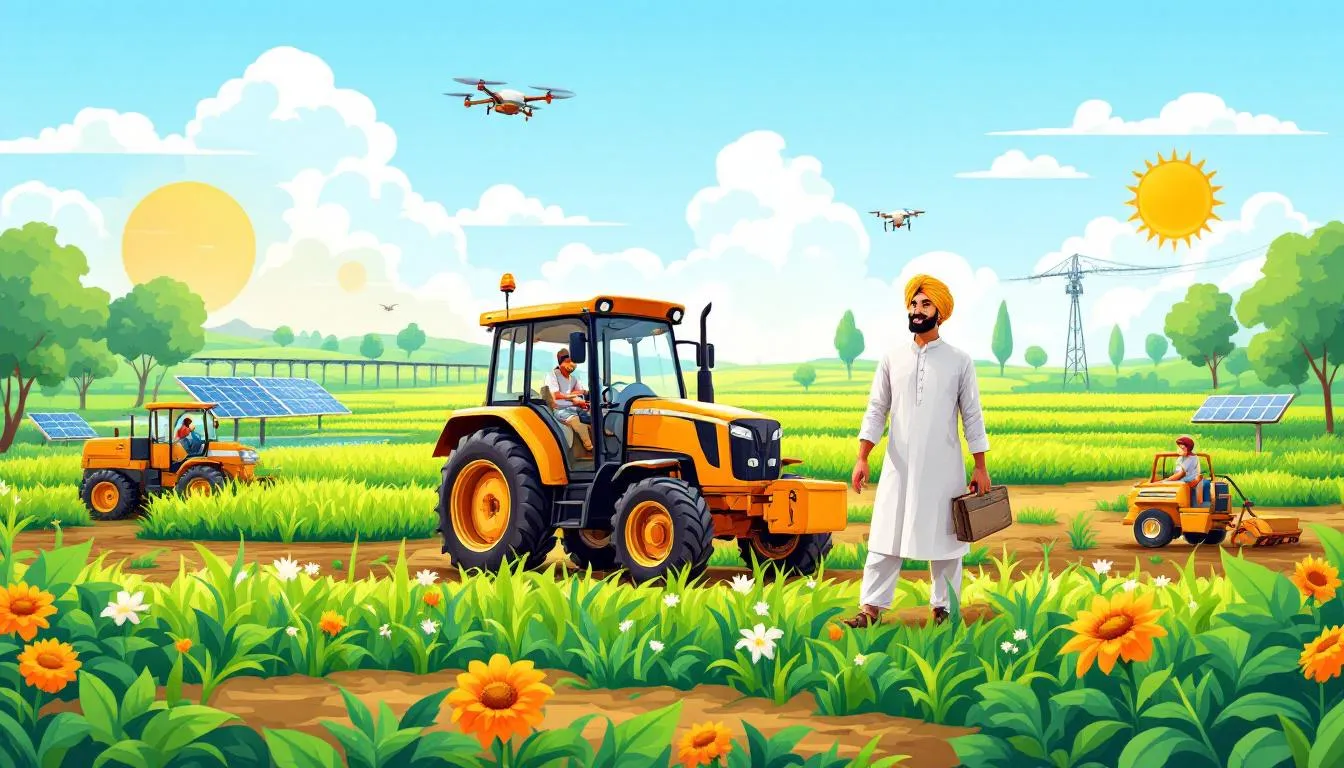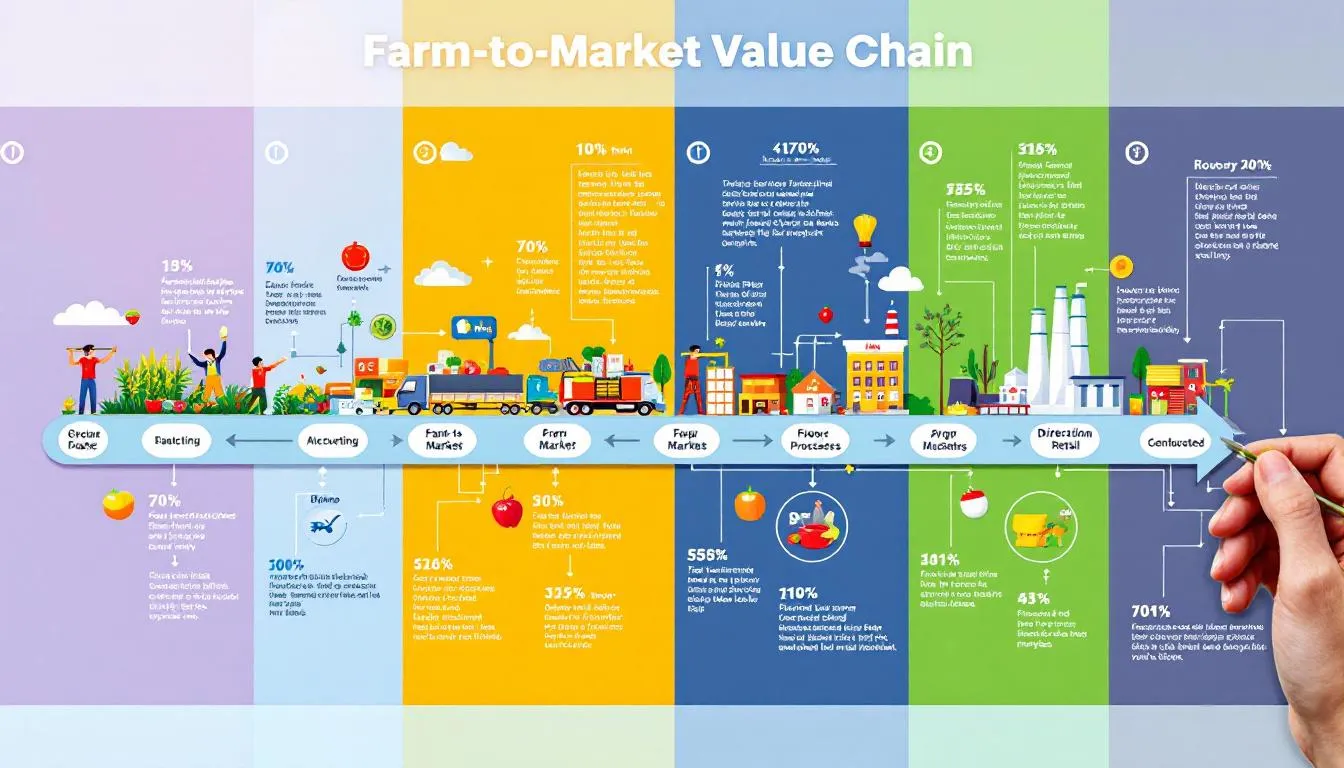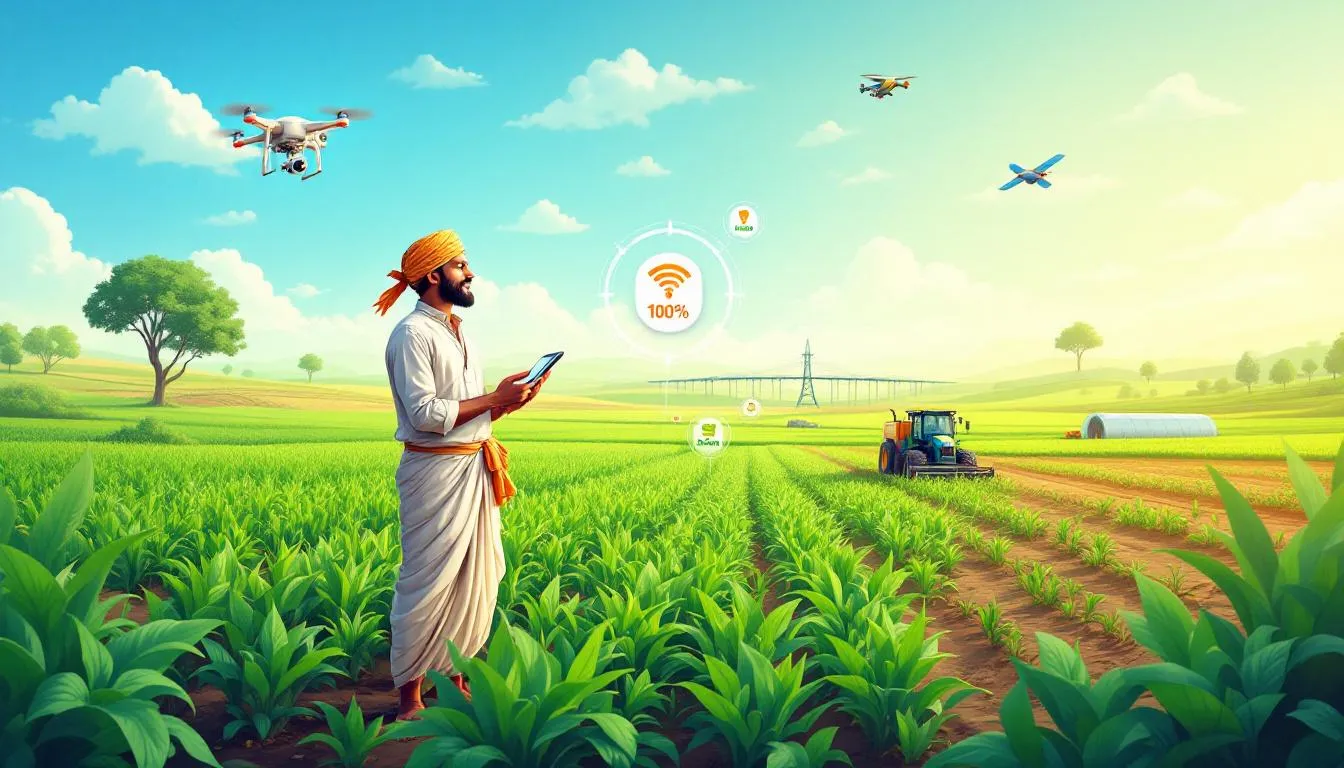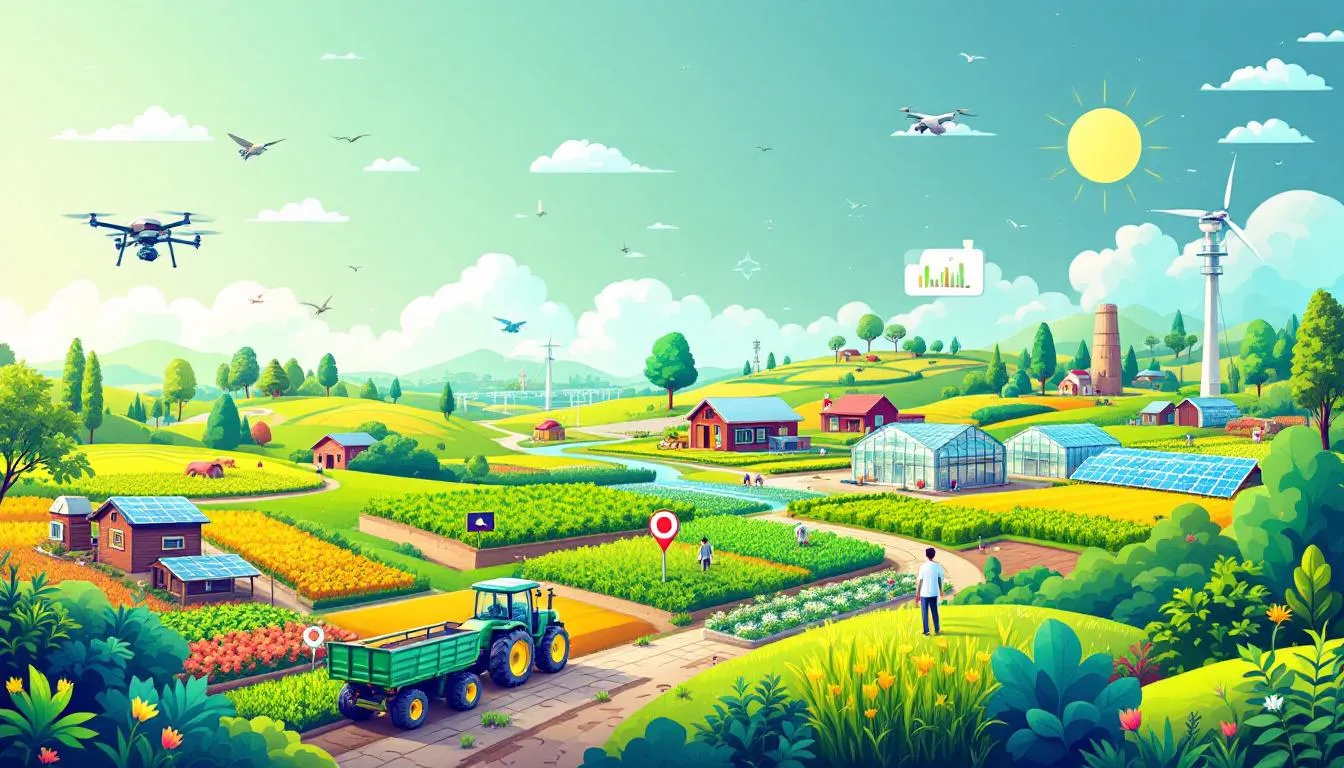Table of Contents
10 Best Innovations Shaping Agribusiness in India
Agribusiness in India is evolving at a rapid pace, driven by technological advancements and increasing market opportunities. This article highlights the latest innovations transforming the sector, the growth of agritech startups, and emerging trends. Discover how these advancements are enhancing productivity and sustainability in Indian agriculture.
Key Takeaways
India’s agritech sector is rapidly expanding, projected to reach a value of $24 billion by 2025, driven by over 1300 startups focusing on innovative solutions for farmers.
Emerging technologies such as AI, IoT, and blockchain are revolutionizing agribusiness by enhancing productivity, sustainability, and supply chain transparency.
Government initiatives and support, along with diverse business models, are crucial for fostering innovation and addressing challenges faced by agritech startups in India.
Evolution of Agribusiness in India

The journey of Indian agriculture from subsistence farming to a commercialized model has been remarkable. Since gaining independence in 1947, India has seen significant shifts in farming practices:
The Green Revolution in the 1960s played a pivotal role.
Introduction of high-yielding seeds and modern agricultural practices led to a surge in crop yields.
This transformation turned India into a food surplus nation.
Farmers were enabled to sell surplus crops in local and national markets.
Market integration improved significantly post-Green Revolution. Farmers were able to tap into local and national markets, enhancing their incomes and contributing to food security. The commercialization of agriculture led to the emergence of a diverse agribusiness sector, encompassing everything from input supply to product processing and food commodities. Digital platforms now facilitate the sale, purchase, and financing of farm inputs, while food processors are increasingly leveraging technology to digitize workflows and connect producers to markets. However, challenges such as low GDP contribution and inadequate infrastructure still persist.
Today, agritech startups are revolutionizing Indian agriculture by providing data-driven farming solutions and innovative tools to increase crop yield. These startups are empowering farmers to adopt sustainable farming practices, improving farm productivity, and ensuring food security. The adoption of agricultural technology is enabling farmers to make informed decisions, monitor crops, and manage resources efficiently.
Size and Growth of India’s Agritech Industry

The agritech market in India is witnessing exponential growth:
Valued at approximately $815 million in 2024
Projected to grow at an annual rate of around 13.50% until 2033
Expected to be worth US$24 billion by 2025
Currently, only 1% of this market potential is realized
This indicates a vast potential for growth and investment in the sector.
Key players in the Indian agritech market driving this growth include:
DeHaat
Ninjacart
Bijak
AgNext
AgroStar
WayCool
With over 1300 few start ups focused on enhancing efficiency through technology, the sector is ripe for innovation.
Investments in India’s agritech sector were US$242 million in 2020, showcasing significant growth potential. Notably, Trifecta Capital Advisors has emerged as a key investor, providing financial backing and credibility to leading agritech startups. These startups are enabling farmers by providing precision agriculture tools, smart farming equipment, and data-driven farming solutions, ultimately leading to increased crop yields and sustainable agriculture.
Emerging Trends in Agribusiness
Emerging trends in agribusiness are redefining the agricultural landscape in India. By 2025, more than 60% of Indian farms are expected to implement AI-driven solutions for precision farming. AI and IoT are revolutionizing farming practices by:
Enabling farmers to optimize resource use
Enhancing crop yields
Making data-driven decisions Real-time crop monitoring through IoT can help reduce food waste by up to 15%, greatly improving supply chain efficiency.
Smart irrigation systems are another trend gaining momentum. These systems can cut water consumption by 30%, promoting more sustainable farming practices. IoT-based technology provides farmers with real-time insights on soil moisture, temperature, and weather conditions, enabling precise irrigation and crop management. The focus on sustainable and organic farming is also growing, driven by consumer demand for eco-friendly products and practices.
Agritech startups are playing a vital role in addressing challenges in agriculture. Companies like Aarav Unmanned Systems are known for their drone solutions that enhance precision agriculture, allowing efficient monitoring and management of crops through satellite imagery. Farmers monitor crop health using drone-based solutions and digital warehousing management, which improves agricultural productivity and crop health oversight. Computer vision is increasingly used in agricultural technology for tasks such as quality assessment of produce, disease detection in crops, and automation of farming processes. An emerging agritech startup is focused on agritech innovations to further improve these processes.
These digital technologies are not only enhancing sustainability in agriculture but also tackling issues related to carbon emissions and waste management. The agritech sector is thus poised to significantly impact food production, farm productivity, and regenerative agriculture.
AI-driven solutions are also transforming quality assessment in agriculture. Quality assessment powered by AI and computer vision ensures produce meets standards, improves customer satisfaction, and reduces losses.
Business Models in Tech-Enabled Agribusiness
Various business models are emerging in the tech-enabled agribusiness sector. A digital marketplace, for instance, connects farmers with suppliers and buyers, facilitating transactions within the agricultural sector. AGRIM is a notable example of a B2B marketplace for agri-inputs. Similarly, CropIn offers a Software-as-a-Service (SaaS) model, providing agricultural management solutions to farmers for a subscription fee. Food service companies also benefit from these digital platforms through improved quality assessment, cost reduction, and supply chain improvements enabled by advanced technologies.
Farming-as-a-Service (FaaS) is another innovative model, providing access to advanced agricultural tools and services through subscription models. Startups like BharatAgri use a Business to Farmer (B2F) model to directly engage with farmers, offering tailored solutions to assist farmers enhance productivity. Direct-to-consumer models, such as Farm2Fam, focus on organic food products, connecting farmers directly to consumers.
These diverse business models are not just enabling farmers but also empowering them to adopt sustainable practices, optimize resource use, and increase crop yields. By providing farmers with access to precision agriculture tools, data-driven farming solutions, and farm management platforms, agritech startups are revolutionizing the agricultural landscape.
Farm-to-Market Value Chain in Agribusiness

Enhancing the farm-to-market value chain is crucial for maximizing the efficiency and profitability of agribusiness. Digital technologies play a significant role in this transformation. Digital platforms enhance the efficiency and transparency of agri-food supply chains, facilitating better logistics and information sharing. This is crucial for ensuring that fresh produce reaches markets in optimal condition, minimizing food waste and maximizing farmer incomes. These innovations are also enabling Indian agribusinesses to expand their reach into global markets, supporting international growth and competitiveness.
Startups like Agrowave and Bijak are simplifying supply chain management by connecting farmers directly to businesses and reducing dependency on middlemen. Agrowave’s mobile app helps farmers sell their produce by connecting them with delivery trucks and offering hassle-free payments. Bijak, on the other hand, ensures better profits for farmers by reducing the role of intermediaries. These innovations are empowering farmers by providing them with direct access to markets, ensuring they get fair prices for their produce.
Ninjacart is another example of a company that reduces inefficiencies in the supply chain, ensuring better prices for both farmers and retail stores. Leveraging IoT for real-time monitoring and decision-making, these startups enhance operational efficiency across the supply chain, ensuring fair compensation for farmers and high-quality produce for consumers.
Technologies Transforming Agriculture

Technological advancements are at the heart of the agribusiness revolution. Innovations such as:
AI
IoT
Blockchain are significantly enhancing productivity and efficiency in the sector. These technologies are not only improving operational efficiency but also enabling sustainable agricultural practices. For instance, big data analytics and AI are utilized by companies like CropIn to monitor farms and optimize productivity.
The integration of these technologies significantly contributes to better resource management and productivity enhancement. The collection and analysis of farm data—such as soil, climate, and crop canopy information—through hardware devices installed on farms provides actionable insights for irrigation, fertilization, and disease prediction, improving farming efficiency. Adopting artificial intelligence and IoT allows farmers to manage their resources more effectively, resulting in higher yields and more sustainable farming practices.
Blockchain technology, on the other hand, is improving traceability and reducing food waste within agri-food supply chains. Together, these innovations are transforming the agricultural landscape, making it more efficient and sustainable.
AI and Machine Learning
AI and machine learning are revolutionizing agricultural practices by providing data-driven decisions and predictive analytics. Platforms like CropIn utilize AI to process vast amounts of agricultural data, offering predictive insights on weather and crop management. This enables farmers to make informed decisions, optimizing their operations and increasing crop yields.
Startups such as Fasal and Wefarm are leveraging AI to enhance farm productivity. Fasal optimizes irrigation and pest control through predictive analytics, while Wefarm uses machine learning to provide farmers with critical information and insights.
Additionally, AgNext Technologies offers advanced analytics to help farmers and buyers make informed decisions about produce quality, further aiding in crop yield optimization. These applications of AI and machine learning are driving significant improvements in agricultural efficiency and productivity.
IoT and Smart Farming
IoT and smart farming technologies are enhancing agricultural efficiency by providing real-time monitoring and precise control over farming operations. For example:
IoT-based soil sensors enable real-time monitoring of soil health and moisture levels.
These sensors allow for precise irrigation.
They contribute to improved crop yields, which are expected to increase by 15-24% by 2025.
Smart farming technologies also contribute to sustainable agriculture by reducing water usage and enhancing crop management. These technologies offer real-time insights on soil moisture, temperature, and weather conditions, enabling precise irrigation and reducing water consumption by up to 30%. This not only enhances farm productivity but also promotes sustainable farming practices.
Blockchain for Supply Chain Transparency
Blockchain technology is increasingly recognized for its potential to improve traceability and transparency within agri-food supply chains. By allowing real-time tracking of agricultural products, blockchain enhances food supply chain transparency, ensuring that consumers receive high-quality produce and that farmers are adequately compensated.
Adoption of blockchain for traceability in supply chains can help reduce post-harvest losses by approximately 10%, significantly enhancing supply chain efficiency. This technology not only improves the agricultural supply chain but also contributes to reducing food waste and ensuring food security.
Machinery and Infrastructure Requirements
Machinery and infrastructure play a vital role in enhancing productivity and efficiency in tech-enabled agribusiness. Farm equipment mechanization, which includes tools and equipment for tasks like planting, irrigation, and harvesting, is essential for boosting productivity. Companies like Intello Labs manufacture sorting, grading, and packaging machines that enhance operational efficiency in agribusiness.
Adequate infrastructure for storage and transportation is also crucial to minimize post-harvest losses. Intello Labs’ all-in-one machine, IntelloFlow, further streamlines farm operations, ensuring that produce reaches markets in optimal condition. Additionally, effective irrigation systems, end to end solutions, and environmental control technologies are vital for successful farming operations.
By investing in the right machinery and infrastructure, agribusinesses can significantly improve their operational efficiency and productivity.
Investment and Project Cost Estimates
Starting a tech-enabled agribusiness in India requires significant investment. The approximate total project cost ranges from ₹25 lakh to ₹80 lakh, depending on the business model and scale of operations. Factors influencing these costs include the type of technology adopted, the extent of mechanization, and the infrastructure required.
Careful planning and management of these investments can lead to substantial returns and drive innovation in the sector.
Raw Materials and Inputs Needed
Raw materials and inputs are critical components of any agribusiness. These include:
Fertilizers, which commonly contain key nutrients such as nitrogen, phosphorus, and potassium, essential for promoting healthy crop growth.
Inhibitors, used to enhance the efficiency of synthetic fertilizers and reduce nitrogen loss.
Growing media for plants, often including organic materials like compost or peat, providing a fertile environment for plant growth.
Animal feed formulations require specific minerals such as copper, zinc, and manganese to ensure the health and productivity of livestock. Soil stabilizers, like lignosulfonates, help combat erosion and maintain topsoil during fallow periods.
By utilizing high-quality raw materials and inputs, agribusinesses can enhance crop yields and ensure sustainable farming practices.
Licenses and Registrations Required
Compliance with various licenses and registrations is essential for agritech startups in India. Key compliance areas include:
Adhering to FSSAI regulations for startups dealing with food products to ensure food safety and quality.
Complying with regulations related to custom hiring for those renting agricultural machinery.
Following state-specific Agricultural Produce Market Committee (APMC) laws necessary for marketing agricultural products.
If land use is involved, startups need to adhere to local land and tenancy regulations. Startups dealing with seeds must comply with seed certification and protection laws, while those dealing with pesticides and fertilizers must observe specific regulations governing their sale and distribution.
Required licenses and registrations include Udyam/MSME Registration, FSSAI License, GST Registration, Startup India Recognition, and Import/Export Code.
Government Schemes and Support
The Indian government offers various schemes and support to promote agritech startups. The Pradhan Mantri Kisan SAMPADA Yojana aims to enhance the agro-processing sector by creating modern infrastructure and efficient supply chain management.
The AgriSURE Fund, launched by NABARD, provides financial support to agritech startups, focusing on innovative and technology-driven agricultural activities. The AgriSURE Fund has a total corpus of ₹750 crore, supported equally by the Government of India and NABARD, along with contributions from private investors.
NABARD also facilitates access to credit and investment for startups that focus on farm mechanization and technological support at the farm level. These government schemes and support are crucial for fostering innovation and growth in the agritech sector, enabling startups to scale their operations and make a significant impact on Indian agriculture.
Sustainable Agriculture Practices
Sustainable agriculture practices are at the heart of India’s push toward a more resilient and productive farming sector. Agritech startups in India are leading the way by introducing precision farming techniques that harness the power of satellite imagery, sensors, and machine learning. These advanced tools enable farmers to monitor soil health, manage irrigation, and optimize crop management, resulting in higher crop yields and reduced resource waste.
Companies like CropIn and FarmERP are at the forefront, offering data-driven farming solutions that empower farmers to make informed decisions about their agricultural land. By analyzing real-time data, these platforms help farmers adopt sustainable farming practices—such as targeted fertilizer application and efficient water use—minimizing the environmental impact of agriculture. This approach not only enhances productivity but also supports long-term soil health and reduces reliance on chemical inputs.
The adoption of sustainable agriculture practices is crucial for ensuring food security and improving farmer livelihoods. By leveraging technology and innovative farming practices, Indian farmers can boost crop yields, protect natural resources, and contribute to a more sustainable agricultural landscape for future generations.
Education and Training in Agribusiness
Education and training are pivotal in equipping farmers and agribusiness professionals with the skills needed to thrive in a rapidly evolving sector. Agritech startups recognize this need and are investing in comprehensive training programs that cover best farming practices, crop management, and understanding market demand.
Startups like Gramophone and BharatAgri are making a real-world impact by providing farmers with advisory services and hands-on training. These initiatives help farmers adopt modern farming practices, improve crop management, and respond effectively to changing market conditions. By empowering farmers with up-to-date knowledge, these programs enable them to make data-driven decisions that enhance productivity and profitability.
In addition to startup-led initiatives, leading institutions such as the Indian Institute of Technology (IIT) and the Indian Council of Agricultural Research (ICAR) offer specialized courses and certifications in agritech and agribusiness. These educational opportunities are building a skilled workforce capable of driving innovation and growth in Indian agriculture, ensuring that the sector remains competitive and sustainable.
Research and Development Driving Innovation
Research and development (R&D) are the engines powering innovation in Indian agribusiness. Agritech startups are investing heavily in R&D to create solutions that address the unique challenges of Indian agriculture, from unpredictable weather patterns to supply chain inefficiencies.
Companies like Ninjacart and WayCool are leveraging machine learning and artificial intelligence to develop predictive models that improve crop yields, detect diseases early, and optimize the agricultural supply chain. These innovations help farmers make smarter decisions, reduce losses, and adapt to the impacts of climate change. By focusing on R&D, agritech startups are not only enhancing the productivity of Indian agriculture but also ensuring its sustainability in the face of evolving environmental and economic pressures.
Through continuous research, these innovative companies are transforming the agricultural landscape, enabling farmers to overcome challenges and seize new opportunities in a rapidly changing world.
Collaboration and Partnerships in Agribusiness
Collaboration and partnerships are key to unlocking the full potential of India’s agribusiness sector. Agritech startups are increasingly joining forces with farmers, suppliers, buyers, and research institutions to create a more efficient and inclusive agricultural supply chain.
For example, DeHaat and AgroStar are building strong partnerships with farmers, providing them with access to markets, finance, and cutting-edge technology. These collaborations enable farmers to improve their productivity and incomes while streamlining the agricultural supply chain. By working together, stakeholders can share knowledge, resources, and expertise, leading to the development of innovative solutions that address the most pressing challenges in Indian agriculture.
Such partnerships not only enable farmers to benefit from the latest advancements but also foster a culture of innovation and shared success across the entire agriculture ecosystem.
Role of the Private Sector in Agribusiness Growth
The private sector is a driving force behind the transformation of Indian agriculture. Agritech startups are at the forefront, introducing innovative technologies, business models, and financial solutions that are reshaping the agricultural supply chain and empowering farmers.
Companies like Jai Kisan and KisanKonnect are providing farmers with much-needed access to credit, insurance, and other financial services, helping to reduce risk and improve livelihoods. The private sector is also investing in critical infrastructure—such as warehouses, cold storage, and transportation networks—that enhances the efficiency and reliability of the agriculture supply chain.
By leveraging their resources and expertise, private sector players are providing farmers with the tools and support needed to increase productivity, access new markets, and adopt sustainable practices. This collaborative approach is making Indian agriculture more competitive, resilient, and profitable, ensuring long-term growth and food security for the nation.
Marketing and Branding Strategies
Effective marketing and branding strategies are essential for the success of agritech startups. Video marketing is highly effective, with educational videos being three times more trusted than traditional banner ads among farmers. Leveraging WhatsApp Business for direct communication has also proven successful, allowing startups to efficiently engage with customers and distributors.
Regional SEO is crucial as over 45% of Google searches in India are conducted in regional languages, which can boost visibility for agritech companies. Email campaigns remain an effective strategy for nurturing relationships with B2B buyers in the agritech sector, helping to keep them informed and engaged.
Targeted ads on platforms like Google and Facebook, tailored to local languages and dialects, have shown success in reaching agritech audiences. By utilizing CRM tools, agritech companies can improve their customer tracking and engagement processes, leading to enhanced sales strategies.
Profit Margins and ROI Analysis
Analyzing profit margins in agritech is crucial for understanding the financial viability of startups and attracting investors. Typical gross margins in agritech range from 20% to 35%, depending on the business model and scale of operations. Precision agriculture techniques can boost profits by approximately $69 per acre for corn, showcasing the potential for substantial returns on investment.
Leveraging data analytics and real-time insights allows agritech startups to optimize operations and achieve significant financial success through data science.
Challenges and Risk Mitigation Strategies
Agritech startups face multiple challenges, including farmer adoption and digital literacy issues, connectivity in rural areas, and funding constraints. Financial risks arise due to significant investments in farming, often requiring smallholder farmers to borrow funds, which can be challenging to repay under adverse conditions. Market risks also pose a threat, with price fluctuations and uncertainties leading farmers to consider strategies like storing produce to sell at better prices later.
Production risks from unfavorable weather patterns, pest infestations, and diseases can directly impact crop quality and yield. To mitigate these risks, farmers can diversify their crops, increasing the chances of successful yields across different growing conditions. Emerging technologies like AI and IoT are essential in addressing climate change impacts on agriculture, providing predictive insights to enhance decision-making and resource management. Automation and robotics are increasingly being adopted to reduce reliance on traditional manual labor and help address labor shortages, especially during peak harvesting periods when seasonal workers are typically required. Crop protection is also a critical aspect of ensuring sustainable farming practices and maintaining crop health.
Successful implementation of digital solutions requires addressing barriers such as high costs and the need for technical expertise. Investors are increasingly focusing on agritech companies with sustainable business models, ensuring long-term profitability and growth. Robust cybersecurity measures are also essential to protect sensitive agricultural and business data from potential threats.
Future Potential of Tech-Enabled Agribusiness in India

The future potential of tech-enabled agribusiness in India is immense. Precision agriculture acts as a catalyst for new business models, creating substantial environmental and economic impacts. Startups like BharatAgri aim to increase farmer incomes, showcasing the growth potential through tech-enabled solutions. The projected impact of Instacrops by 2026 includes transforming the lives of 5,000 farmers and saving over 2.5 billion gallons of water. Leading agritech company aims include promoting sustainable practices, expanding operations, and achieving significant environmental and social impact within the industry.
Measuring social and environmental impacts is crucial for agritech startups to maintain trust in customer relationships and validate their contributions to real world impact. Instacrops’ technology has achieved a 12% increase in crop productivity, demonstrating the efficacy of tech innovations. By leveraging precision farming solutions, agritech startups can significantly enhance farm productivity, ensure sustainable agriculture, and contribute to food security. Many digital platforms and innovative solutions are specifically designed to support small scale farmers, offering tailored advice, community support, and improved market access.
New startup ideas in agriculture have the potential to create a major impact, reflecting the evolving landscape of agritech. Providing farmers with data-driven farming solutions, precision agriculture tools, and innovative technologies makes the future of Indian agriculture promising. Automation and robotic solutions are also being developed for specialty crops, addressing labor-intensive harvesting processes and enhancing efficiency for high-value, labor-sensitive crops. This transformation will not only improve farming practices but also empower farmers and ensure a sustainable agricultural landscape.
Summary
The integration of technology in agribusiness is revolutionizing Indian agriculture, driving significant improvements in productivity, sustainability, and efficiency. From the evolution of agribusiness to the growth of the agritech sector, emerging trends, and innovative business models, the impact of technology is evident. Startups are playing a crucial role in empowering farmers, providing them with data-driven solutions, and enhancing the farm-to-market value chain.
Looking ahead, the future potential of tech-enabled agribusiness in India is immense. By leveraging AI, IoT, blockchain, and other advanced technologies, the sector can achieve substantial environmental and economic impacts. Government schemes and support, effective marketing strategies, and robust risk mitigation measures are essential for fostering innovation and growth. As we move forward, the continued adoption of technology will ensure a sustainable and prosperous agricultural landscape in India.
Frequently Asked Questions
What is the scope of agribusiness in India?
The scope of agribusiness in India is extensive, encompassing farm management, supply chain management, marketing, and finance, while providing career opportunities in various sectors such as farming, retail marketing, and food manufacturing. This diverse agribusiness landscape is pivotal for economic growth and sustainability in the country.
Which agriculture is most profitable in India?
Poultry farming is considered one of the most profitable agricultural ventures in India, along with goat farming and saffron cultivation. Each of these sectors offers significant returns, making them attractive options for investors.
What are the key technologies transforming agribusiness in India?
AI, IoT, blockchain, and precision agriculture tools are the key technologies transforming agribusiness in India by improving productivity, sustainability, and efficiency. These advancements are essential for modernizing farming practices.
How can agritech startups improve the farm-to-market value chain?
Agritech startups can enhance the farm-to-market value chain by implementing digital platforms that boost supply chain efficiency and facilitate direct connections between farmers and businesses, minimizing reliance on intermediaries.
What are the investment and project cost estimates for starting a tech-enabled agribusiness in India?
The investment required to start a tech-enabled agribusiness in India typically ranges from ₹25 lakh to ₹80 lakh, influenced by the specific business model and scale of operations. It’s essential to carefully plan your budget to align with your objectives and market conditions.
Get Your Agribusiness eBook
Explore the Future of Agribusiness eBook
What Readers Are Saying

Rahul Mehta

Priya Sharma
-

eBook AI Manufacturing Ideas
₹500 -

eBook White Label Business
₹500 -

eBook Indian Jewellery Business
₹500 -

eBook Imitation Jewellery Business
₹500 -

eBook Diamond Gemstone Jewellery
₹500 -

eBook Jewellery Franchise
₹500 -

eBook Jewellery Export
₹500 -

eBook Lab Grown Diamond
₹500 -

eBook Medical Devices Manufacturing
₹500 -

eBook Ayurvedic Cosmetic
₹500 -

eBook 3D Printing Business
₹500 -

eBook Rare Earth Magnet Recycling
₹500 -

eBook Gold Refining Business
₹500 -

eBook Drone Parts Manufacturing
₹500 -

eBook Moduler Funiture
₹500 -

eBook on Future of Agribusiness
₹500
